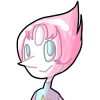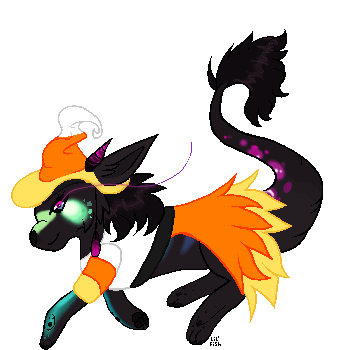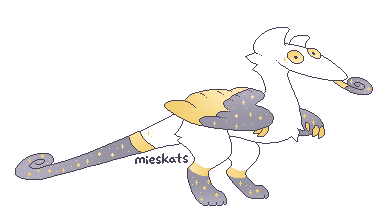Forum rules
Oekaki posts must follow our Rules for the Site and Forum,
including the Oekaki Rules and Art Rules.
Having trouble using oekaki? Check out the Oekaki Guide or send in a help ticket.
Oekaki posts must follow our Rules for the Site and Forum,
including the Oekaki Rules and Art Rules.
Having trouble using oekaki? Check out the Oekaki Guide or send in a help ticket.
Official Parrapup Nursery Open! by Beatnik
| Based on | Click to view |
| Artist | Beatnik [gallery] |
| Time spent | 34 minutes |
| Drawing sessions | 1 |
| 69 people like this | Log in to vote for this drawing |
Official Parrapup Nursery Open!

Parrapups, or Parras, are an omnivorous, aviary quadrupedal species that originated from tropical areas, but after they were domesticated, they gained more levels of fur and different beaks. All parras spend a lot of time cleaning themselves, and preening their feathers if they have wings. Parras come with a variety of tails and beaks, but good luck finding one that does! Having a large gene pool Parras also have the chance to show some mutations. They come in a large variety of colors including bright neons and dull greys. All parras are a very social in some way and love to whistle, sing, and chatter to others- Parra or not!
Here Breeders will be able bring on the next generation of Parrapups! Parrapups have a breeding season in the wild of only during the summer and spring, but domesticated Parras breed all year round!
If you want more information, go here!
By the time that your babies are ready to be taken home most of them have taken on the characteristics of the star sign they were born to follow:♫ Extremely calm babies eat a lot and tend to be kind of whiny, but they grow up to be the strongest and calmest. (Taurus, Virgo, and Capricorn)
♪ Playful babies are the one's to grow up to be very social and outgoing! (Aries, Leo, and Sagittarius)
♫ The easily irritated tend to nip when they are, and they usually only have good relationships with their families. (Cancers, Scorpios, and Pisces)
♪ Curious babies are easy to lose, but grow up the smartest! (Gemini, Libra, and Aquarius)
(Note: Your babies do not have to be born under the month of the zodiac they follow. If your baby is born in December, they can still act as a Taurus. This will be explained more later on in time)
Nursery Rules
- - Triplets are extremely rare and there shouldn't be many of them to naturally happen.
- Each nest has at least two hatchlings.
- Between the mates, the owner(s) can only take home one (each). Siblings with the same parent tend to quarrel when living with each other. This means if you own parent one and you breed with parent two, you can take home one sibling. If you breed these parents again after they are ready to breed again, you cannot take home a sibling. If your parrapup changes it's mate, you can't take home one more sibling.
- You can only take a max of two nursery babies for now.
- Parrapup hatchlings grow to adolescents in a month and adults in another month.
- Owners choose between keeping a baby, gifting, or adopting out.
- You cannot sell the babies.
- You can own both parents, but that means you must gift or adopt out the one (two) you are not keeping.
- There is a two week cool down (After babies have settled in or found new homes)
- The only parent to go on cooldown is the conceiving parent as they take care of babies.
Notes
- - Midgets can breed with other midgets but not full sized parras
- Parras have a small chance of having midget babies, and midgets have a chance to have full sized parra babies.
Mutations
Mutations do happen in Parrapup babies, but they can be very uncommon. Most of the time it is just a strange color that neither of the parents originally had, or possibly a different beak or tail. (If breeders/artists want to make a more drastic edit, they must ask me first.)
Mutations do happen in Parrapup babies, but they can be very uncommon. Most of the time it is just a strange color that neither of the parents originally had, or possibly a different beak or tail. (If breeders/artists want to make a more drastic edit, they must ask me first.)
Attention to my Breeders
It is required that each parrapup has a song. If they don't include it, they should probably get that information otherwise the ticket cannot be accepted. It's a fill out the whole form deal. If they don't link to the parrapups breeding, the ticket cannot be accepted because parrapups are allowed to have names that match. And finally the biggest issue I've had:
Each person can only have 2 parrapups from the nursery. These parrapups cannot be related. So if their parra has a child, that is the only one they can keep. I am very tempted to stop gifting since right now, no one has an up to date archive, but the people receiving parras aren't taking responsibility for how many parras they can have from the nursery. SECONDLY: Adopters must have the main thread marked! just because it's a nursery parra, doesn't mean that it doesn't follow the same rules as the adults.
Thank you for reading all of this, and I will be watching more carefully. If I see anymore hugely edited orphans, excessive use of heterochromia, or any issues above, I will be having a word with you, and/or removing you off the nursery.
Last edited by Beatnik on Sun Aug 31, 2014 2:03 pm, edited 8 times in total.
-

Beatnik - Posts: 4586
- Joined: Mon Jul 25, 2011 9:08 pm
- My pets
- My items
- My wishlist
- My gallery
- My scenes
- My dressups
- Trade with me
Forms

1x1
These are the standard breedings. They generally have 2 eggs, but can sometimes have 3.
- Code: Select all
[center][b]Parent Conceiving:[/b]
[b]Song:[/b]
[b]Owned by:[/b]
[b]Parent Breeding:[/b]
[b]Song:[/b]
[b]Owned by:[/b]
[b]Previous Breedings?[/b][/center]

2x1
Unlike 1x1, these pairings end up with 2 babies or, more commonly, 3. In these cases, there can be two separate parents to another parent ready to breed. Just like domesticated cats, there is only one parent who conceives, and then there can be multiples of parents that have bred with them. In the case of Parrapups, the parent who is not conceiving usually has a good relationship with the third party mate in the breeding. Parent one and Parent two must have previously been mates for two weeks, but the third parent can just be another parrapup that gets along with the breeding parent.
- Code: Select all
[center][b]Parent Concieving:[/b]
[b]Song:[/b]
[b]Owned by:[/b]
[b]Parent Breeding:[/b]
[b]Song:[/b]
[b]Owned by:[/b]
[b]Third Party Parent:[/b]
[b]Song:[/b]
[b]Owned by:[/b]
[b]Will they be helping raise the clutch?[/b]
[b]Previous Breedings?[/b][/center]
Last edited by Beatnik on Mon Jul 28, 2014 2:06 pm, edited 4 times in total.
-

Beatnik - Posts: 4586
- Joined: Mon Jul 25, 2011 9:08 pm
- My pets
- My items
- My wishlist
- My gallery
- My scenes
- My dressups
- Trade with me
Cool Down
Parrapups on Cool Down:
Last edited by Beatnik on Fri Aug 01, 2014 3:35 pm, edited 2 times in total.
-

Beatnik - Posts: 4586
- Joined: Mon Jul 25, 2011 9:08 pm
- My pets
- My items
- My wishlist
- My gallery
- My scenes
- My dressups
- Trade with me
Breeding Log
Parrapups Previously Bred:
-

Beatnik - Posts: 4586
- Joined: Mon Jul 25, 2011 9:08 pm
- My pets
- My items
- My wishlist
- My gallery
- My scenes
- My dressups
- Trade with me
Special Parrapup Breeding Log
Special Parrapups Log
(Here parrapups, with only a certain amount of times that a gene can pass on, will be displayed after with how many more times the gene can pass on if it can)
(Here parrapups, with only a certain amount of times that a gene can pass on, will be displayed after with how many more times the gene can pass on if it can)
-

Beatnik - Posts: 4586
- Joined: Mon Jul 25, 2011 9:08 pm
- My pets
- My items
- My wishlist
- My gallery
- My scenes
- My dressups
- Trade with me
Re: Official Parrapup Nursery Open!
mark
Last edited by PerfectWorld on Wed Jul 30, 2014 1:13 pm, edited 1 time in total.
-

PerfectWorld - Posts: 7301
- Joined: Fri Oct 23, 2009 9:11 am
- My pets
- My items
- My wishlist
- My gallery
- My scenes
- My dressups
- Trade with me
Re: Official Parrapup Nursery Open!
- Mark : D all my parras are open for romance so we can make the babies go round~ cx can't wait to see future kids QuQ and Beat, I love the third party idea c: I studied cats at one point and didn't think anyone on CS would take this risk c: I love it cx though I have a few questions about it, if there are only two (or three) does the third party have any fighting chance of receiving one or would that only be decided among the parents? Another thing, can Same sex pairings have kids without a third party? I think that it's go now? Thanks love c:
-

Little Fish - Posts: 5337
- Joined: Fri Jan 28, 2011 11:20 am
- My pets
- My items
- My wishlist
- My gallery
- My scenes
- My dressups
- Trade with me
Re: Official Parrapup Nursery Open!
Little Fish wrote:Mark : D all my parras are open for romance so we can make the babies go round~ cx can't wait to see future kids QuQ and Beat, I love the third party idea c: I studied cats at one point and didn't think anyone on CS would take this risk c: I love it cx though I have a few questions about it, if there are only two (or three) does the third party have any fighting chance of receiving one or would that only be decided among the parents? Another thing, can Same sex pairings have kids without a third party? I think that it's go now? Thanks love c:
Same Sex don't matter, that's why I kept the sexes out of the form. Hell, three Parras of the same sex can all breed. The parras don't have to be mates either, they can just breed. =w= But I do understand some people want the parents to be in a relationship.
As for the third party, generally there will be three, but in the case of two, it is up to the people who breed them. They can also breed them again in two months with a promised baby to be gifted to the third party. Or you could do first pick of the litter kind of thing.

[Chicken is not a part of a species, they have been my fursona for a few years now]
Hi! If you see me here, no u didnt
-

Beatnik - Posts: 4586
- Joined: Mon Jul 25, 2011 9:08 pm
- My pets
- My items
- My wishlist
- My gallery
- My scenes
- My dressups
- Trade with me
Re: Official Parrapup Nursery Open!
I'm now open for breedings :D
Last edited by ege on Fri Aug 01, 2014 7:54 am, edited 1 time in total.
-

ege - Posts: 11474
- Joined: Wed May 23, 2012 2:08 pm
- My pets
- My items
- My wishlist
- My gallery
- My scenes
- My dressups
- Trade with me
Re: Official Parrapup Nursery Open!
My slots are now open. ^^
Last edited by reilly on Fri Aug 01, 2014 7:51 am, edited 1 time in total.
sorry I may be inactive for a while
something has come up
if you need to contact me please pm me but don't expect a quick reply
something has come up
if you need to contact me please pm me but don't expect a quick reply
-

reilly - Posts: 4083
- Joined: Fri Apr 15, 2011 12:15 pm
- My pets
- My items
- My wishlist
- My gallery
- My scenes
- My dressups
- Trade with me
Who is online
Users browsing this forum: BlueEyedKite, ChristainAnimalLover and 3 guests




















